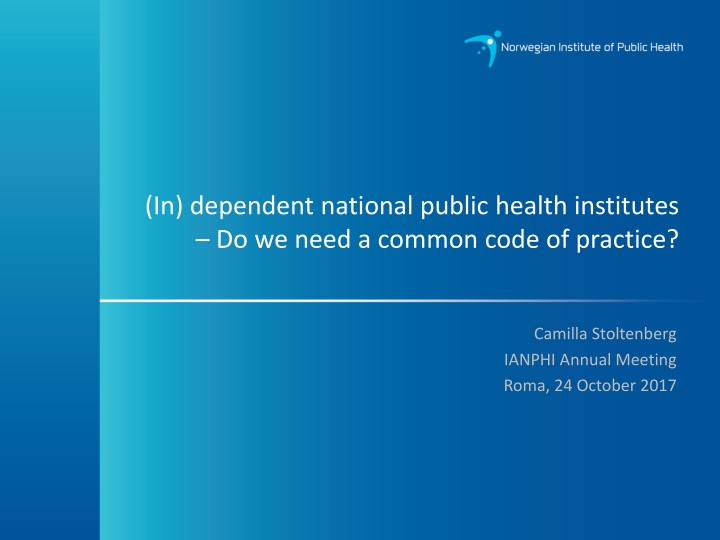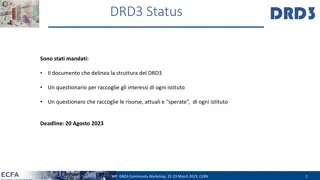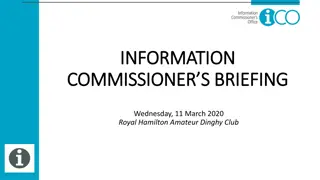Importance of Independent National Public Health Institutes
National Public Health Institutes play a crucial role in public health, but their independence, both financially and scientifically, is essential. Examples show the need for a common code of practice to ensure transparency and unbiased reporting. The European Statistical System is a model for maintaining independence and credibility through principles like professional independence, data collection mandate, and commitment to quality.
Download Presentation

Please find below an Image/Link to download the presentation.
The content on the website is provided AS IS for your information and personal use only. It may not be sold, licensed, or shared on other websites without obtaining consent from the author.If you encounter any issues during the download, it is possible that the publisher has removed the file from their server.
You are allowed to download the files provided on this website for personal or commercial use, subject to the condition that they are used lawfully. All files are the property of their respective owners.
The content on the website is provided AS IS for your information and personal use only. It may not be sold, licensed, or shared on other websites without obtaining consent from the author.
E N D
Presentation Transcript
(In) dependent national public health institutes Do we need a common code of practice? Camilla Stoltenberg IANPHI Annual Meeting Roma, 24 October 2017
(In)dependence Ideal Organisationally and financially dependent Scientifically and technically independent Can the National Public Health Institutes (NPHI s) be sufficiently independent in science and advice when we are dependent financially? Example Before approval of the International Health Regulations (IHR) (2005) many examples of governments concealing or denying outbreaks and epidemics (e.g. cholera outbreaks) to prevent national panic and international sanctions. One of the aims of the IHR (2005) is to avoid secrecy. Are the NPHI s sufficiently strong and independent to inform the public if the political authorities want to cover it up?
National Bureaus of Statistics Example Europe 2010 Biased reporting of the size of the budget deficit by Greek government Greece was heavily criticised for not having a scientifically strong and independent National Bureau of Statistics (NBS), which could have reported truthfully on the economic development Obliged to reorganise its NBS and to ensure its independence Eurostat, the statistical office of the European Union, revised its Code of practice (CoP)
European statistical system Vision and mission Code of Practice (CoP) Vision The European Statistical System will be a world leader in statistical information services and the most important information provider for the European Union and its Member States. Based on scientific principles and methods, the European Statistical System will offer and continuously improve a programme of harmonised European statistics that constitutes an essential basis for democratic processes and progress in society. Mission We provide the European Union, the world and the public with independent high quality information on the economy and society on European, national and regional levels and make the information available to everyone for decision-making purposes, research and debate European Statistics Code of Practice 15 principles and 79 indicators
European Statistics Code of Practice (CoP) Institutional Environment Institutional and organisational factors have a significant influence on the effectiveness and creditability of a statistical authority developing, producing and disseminating European Statistics. The relevant issues are professional independence, mandate for data collection, adequacy of resources, quality commitment, statistical confidentiality, impartiality and objectivity. Principle 1 Professional Independence Principle 2 Mandate for Data Collection Principle 3 Adequacy of Resources Principle 4 Commitment to Quality Principle 5 Statistical Confidentiality Principle 6 Impartiality and Objectivity
European Statistics Code of Practice (CoP) (Cont.) Statistical Processes European and other international standards, guidelines and good practices are fully observed in the processes used by the statistical authorities to organise, collect, process and disseminate European Statistics. The credibility of the statistics is enhanced by a reputation for good management and efficiency. The relevant aspects are sound methodology, appropriate statistical procedures, nonexcessive burden on respondents and cost effectiveness. Principle 7 Sound Methodology Principle 8 Appropriate Statistical Procedures Principle 9 Non-excessive Burden on Respondents Principle 10 Cost Effectiveness
European Statistics Code of Practice (CoP) (Cont.) Statistical Output Available statistics meet users needs. Statistics comply with the European quality standards and serve the needs of European institutions, governments, research institutions, business concerns and the public generally. The important issues concern the extent to which the statistics are relevant, accurate and reliable, timely, coherent, comparable across regions and countries, and readily accessible by users. Principle 11 Relevance Principle 12 Accuracy and Reliability Principle 13 Timeliness and Punctuality Principle 14 Coherence and Comparability Principle 15 Accessibility and Clarity
Challenges to scientific and technical independence Challenges to scientific and technical independence can be measured along several axes: Legal framework Organisational structure Recruitment and discharge of staff Financing models, resource allocation and securing of funds Quality assurance systems Transparency and approval processes before publication























